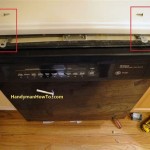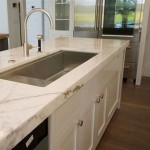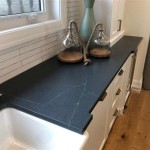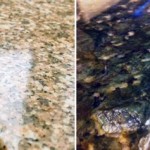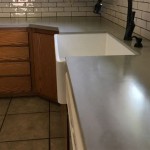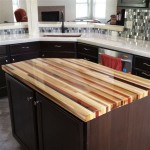What Is The Best Solid Surface Countertop?
Solid surface countertops have gained immense popularity in recent years, becoming a top choice for homeowners seeking durable, stylish, and low-maintenance surfaces for their kitchens and bathrooms. However, the term "solid surface" encompasses a wide range of materials, each with its own unique properties and advantages. Determining the "best" solid surface countertop depends entirely on individual needs, preferences, and budget constraints. This article will explore various types of solid surface countertops, highlighting their key features, advantages, and drawbacks to help you make an informed decision.
Types of Solid Surface Countertops
The most common types of solid surface countertops include:
1. Quartz: Quartz countertops are engineered stone consisting of approximately 93% crushed quartz crystals mixed with resin and pigments. They are renowned for their exceptional durability, scratch resistance, and stain resistance. Quartz surfaces are available in a vast array of colors and patterns, mimicking the look of natural stone.
2. Acrylic: Acrylic countertops are composed of a blend of acrylic polymer and pigments. They are known for their seamless, non-porous surface, making them highly resistant to stains and bacteria. Acrylic surfaces are also relatively easy to repair, and they come in a variety of colors and textures.
3. Corian: Corian is a brand name for a specific type of acrylic solid surface. It offers excellent durability, seamless joints, and a wide range of colors and patterns. Corian also benefits from its ability to be easily repaired and its resistance to stains and bacteria.
4. Engineered Stone: Engineered stone is a broad category encompassing various materials like granite, marble, and quartzite, combined with resins and pigments. These surfaces mimic the appearance of natural stone while offering enhanced durability and lower maintenance requirements.
5. Concrete: Concrete countertops are made from a mixture of cement, aggregates, and pigments. They offer a unique industrial aesthetic and can be customized with various finishes and colors. Concrete surfaces are generally durable and resistant to heat, but they require sealing to prevent staining.
Factors to Consider When Choosing Solid Surface Countertops
Selecting the best solid surface countertop involves considering several factors, including:
1. Budget: Solid surface materials vary significantly in price, with quartz being the most expensive option and acrylic being more budget-friendly. It's essential to establish a budget range before exploring specific materials and brands.
2. Durability and Maintenance: Consider the level of wear and tear the countertop will be subjected to. Quartz is known for its exceptional durability, while acrylic requires more care to prevent scratches. Concrete surfaces also require regular sealing.
3. Style and Aesthetics: Solid surface countertops come in a wide array of colors, patterns, and finishes. Choose a material that complements your overall kitchen or bathroom design.
4. Functionality: Consider the specific needs of your kitchen or bathroom. If you frequently prepare meals with acidic ingredients, choose a material that's resistant to staining. For bathrooms, opt for a non-porous material that prevents bacteria growth.
Advantages and Disadvantages of Solid Surface Countertops
Each type of solid surface countertop has its own set of advantages and disadvantages to consider:
Quartz
Advantages:
- Highly durable
- Scratch-resistant
- Stain-resistant
- Wide variety of colors and patterns
- Low maintenance
Disadvantages:
- Expensive
- Can feel cold to the touch
- Not as easily repaired as acrylic
Acrylic
Advantages:
- Seamless, non-porous surface
- Stain-resistant
- Resistant to bacteria growth
- Easy to repair
- Budget-friendly
Disadvantages:
- Less durable than quartz
- Susceptible to scratches
- Limited color and pattern options compared to quartz
Corian
Advantages:
- Seamless joints
- Resistant to stains and bacteria
- Easy to repair
- Wide range of colors and patterns
Disadvantages:
- Can be prone to scratching
- Not as durable as quartz
- May be more expensive than acrylic
Engineered Stone
Advantages:
- Durable
- Resistant to stains and scratches
- Wide variety of colors and patterns
- Offers the look of natural stone
Disadvantages:
- Can be expensive
- May be less durable than quartz
- May require sealing
Concrete
Advantages:
- Unique, industrial aesthetic
- Durable
- Resistant to heat
- Customizable
Disadvantages:
- Requires sealing to prevent staining
- Can be porous
- May crack or chip if not properly installed
Ultimately, the best solid surface countertop for your home is the one that aligns with your specific needs, budget, and aesthetic preferences. Thoroughly research different materials, consider their pros and cons, and seek professional advice from countertop installers to ensure a successful project.

Quartz Vs Solid Surface Which Is Better For Kitchen Countertops Lx Hausys

Countertop Comparison Chart Which Material Is Right For You

Important Things To Know About Solid Surface Countertops Bob Vila

Solid Surface Countertops

Best Solid Surface Countertops Vs Quartz 2024 Opaly

Quartz Vs Solid Surface Which Is Better For Kitchen Countertops Lx Hausys

Benefits Of Solid Surface Countertops For Your Home R D Marble

Solid Surface Designs

Why Solid Surface Counters Are A Great Choice The House Designers

The Best Corian Countertop Colors Of 2024 For Kitchen Remodel
See Also

